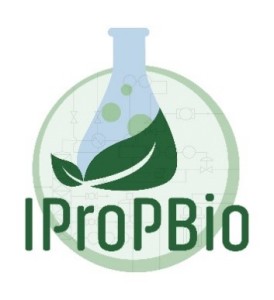IProPBio is a project funded by MSCA-RISE-2017: Research and Innovation Staff Exchange of the Horizon 2020 Framework Programme. It includes nine EU beneficiaries, seven of which are Universities, one research center, one company and three Third Countries, namely the United States, Mexico and Brazil. The project has a budget of 594,000 € and a time span of four years starting the first of January 2018.
Objectives
As depicted by the project logo, there is a fundamental integration between the biomass characterization andvalorization, represented by the green leaves, the study of the potential for recovery of high valuable compounds as indicated by the Erlenmeyer flask, the design and optimization of the production process, as shown by the flowsheet in the background, and a life cycle analysis expressed by the circularity of the logo.
Project implementation
The project paradigm can be represented by four research-related work packages and 2 support packages dedicated to the coordination, knowledge sharing and communication strategy.
In particular the work package 1 “Feed and product characterization. Thermodynamic data and property estimation” has as main objectives the identification of different biomasses available in the counties of the project partners, the study of their availability and the characterization of the valuable components obtainable. Moreover, this work package includes the thermodynamic characterization and the components property estimation essential to the developing of reliable process models. The second work package is named “Process synthesis” and includes the definition of the process alternatives for the production of the valuable compounds identified in the previous work package. The results obtained are used in the third work package “Process design and optimization” where the different process alternatives are simulated and optimized following a multi-objective approach that includes the economy, the environmental impact and the process controllability. The research content of the project terminates with the fourth work package “Process integration, intensification and life cycle assessment” that aims to develop methods for energy and mass integration, minimization of the water consumption and life cycle assessment.
estimation” has as main objectives the identification of different biomasses available in the counties of the project partners, the study of their availability and the characterization of the valuable components obtainable. Moreover, this work package includes the thermodynamic characterization and the components property estimation essential to the developing of reliable process models. The second work package is named “Process synthesis” and includes the definition of the process alternatives for the production of the valuable compounds identified in the previous work package. The results obtained are used in the third work package “Process design and optimization” where the different process alternatives are simulated and optimized following a multi-objective approach that includes the economy, the environmental impact and the process controllability. The research content of the project terminates with the fourth work package “Process integration, intensification and life cycle assessment” that aims to develop methods for energy and mass integration, minimization of the water consumption and life cycle assessment.
The success of the project is based on the partners´ knowledge complementarity that ranges from theoretical to experimental passing through programming and modelling. Secondments are the main tool used for exchange of advanced knowledge, expertise, technologies and expanding synergies among the labs of the Consortium.
Activities and updates
Four workshops – “Valuable products from residual biomasses: Towards a greener society (ProGreS)” are envisaged within the IProPBio time span. On the 23 and 24th of September 2019 The First IProPBio Workshop: “Biomass selection, characterization and valorization”, will take place in Sofia, Bulgaria. The workshop is open to the general public and free of charge. Professor Sir William Wakeham will give the plenary lecture “The dangerous nexus of process simulation, molecular modelling and physical reality”.
Up to now, the results of the IProPBio research have been published in a number of articles and presented at international conferences and symposia. The project progress can be followed on the website: www.ipropbio.sdu.dk or on twitter: @IProPBio. Furthermore, more information can be obtained by email at: ipropbio@kbm.sdu.dk
Project partners and contacts
University of Southern Denmark, Instituto Superior de Engenharia de Lisboa, University of Patras, Consiglio Nazionale delle Ricerche, Universidad de Salamanca, Instituto Superior Técnico, University College London, Institute of Chemical Engineering, Bulgarian Academy of Sciences, Federal University of Paraná, Texas Engineering Experiment Station, Instituto Tecnologico de Aguascalientes, Santzouk Samir & Co. General Partnership
![]() The project IProPBio is funded by the European Commission under grant agreement no. [778168].
The project IProPBio is funded by the European Commission under grant agreement no. [778168].


